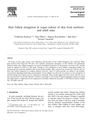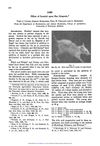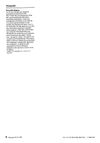 26 citations,
February 2002 in “Urologic clinics of North America”
26 citations,
February 2002 in “Urologic clinics of North America” The document concludes that it's important to understand the placebo effect when evaluating the effectiveness of treatments in medical trials.
 February 2023 in “Aesthetic Cosmetology and Medicine”
February 2023 in “Aesthetic Cosmetology and Medicine” Medicinal plants in nutricosmetics contain compounds that can improve skin and hair health.
 October 2021 in “Interfaces Científicas”
October 2021 in “Interfaces Científicas” Nutricosmetics for hair treatment often contain biotin, pyridoxine, zinc, and other nutrients, but more research and professional guidance are needed for their use.
180 citations,
October 2019 in “British journal of haematology” Early detection and treatment of iron deficiency in pregnancy are crucial for maternal and infant health.
 23 citations,
May 1998 in “Journal of Dermatological Science”
23 citations,
May 1998 in “Journal of Dermatological Science” Insulin or IGF-I is needed for hair growth in newborn mice, while minoxidil helps adult mouse hair grow, suggesting a way to study human hair loss.
20 citations,
February 1994 in “In vitro cellular & developmental biology. Animal” Wool follicles can grow in a lab with the right nutrients and conditions.
 20 citations,
November 1943 in “Experimental Biology and Medicine”
20 citations,
November 1943 in “Experimental Biology and Medicine” Inositol helped prevent and cure hair loss in rats.
 12 citations,
January 2016 in “Journal of Clinical and Investigative Dermatology”
12 citations,
January 2016 in “Journal of Clinical and Investigative Dermatology” Low vitamin D levels are common in people with Alopecia Areata.
11 citations,
August 2012 in “BMJ case reports” Ban Tu Wan, a Chinese herbal supplement, can cause severe liver damage.
 11 citations,
June 2012 in “Archives of Dermatological Research”
11 citations,
June 2012 in “Archives of Dermatological Research” L-cystine and vitamin B6 at high doses prevented hair loss in mice treated with a chemotherapy drug.
1 citations,
October 2010 in “Pediatrics in review” Some alternative therapies might help treat eating disorders when combined with standard care, but more research is needed to confirm their safety and effectiveness.
 June 1982 in “Reactions (Auckland)”
June 1982 in “Reactions (Auckland)” Metoprolol and propranolol may cause hair loss.
June 2022 in “Endocrine Abstracts” Finasteride can cause lasting skin lightening in women.
466 citations,
June 2009 in “Experimental dermatology” We now understand more about what causes acne and this could lead to better, more personalized treatments.
 239 citations,
July 2002 in “Clinical and Experimental Dermatology”
239 citations,
July 2002 in “Clinical and Experimental Dermatology” Low iron and L-lysine levels can cause hair loss in women, and increasing these nutrients can reduce hair shedding.
 90 citations,
December 2007 in “Current Oncology”
90 citations,
December 2007 in “Current Oncology” Non-hormonal treatments should be used first for sexual dysfunction in postmenopausal breast cancer patients on aromatase inhibitors, with hormones as a second option.
 74 citations,
August 2006 in “Journal of clinical gastroenterology”
74 citations,
August 2006 in “Journal of clinical gastroenterology” Shen-Min, a hair growth supplement, likely caused acute hepatitis in a woman, improving after she stopped taking it.
66 citations,
July 2005 in “Journal of pediatric gastroenterology and nutrition” A 5-year-old girl had liver damage twice after using the herbal product Shou-Wu-Pian.
 63 citations,
March 2000 in “Annals of clinical psychiatry”
63 citations,
March 2000 in “Annals of clinical psychiatry” Some psychiatric medications can cause hair loss, but it usually grows back after adjusting the medication.
 48 citations,
February 2008 in “Nutrition in Clinical Practice”
48 citations,
February 2008 in “Nutrition in Clinical Practice” Dietary changes, including weight loss and a balanced diet, are important for managing PCOS, especially in overweight women.
 41 citations,
March 2007 in “Journal of dermatological science”
41 citations,
March 2007 in “Journal of dermatological science” Taking L-cystine and vitamin B6 can prevent hair loss caused by smoke in mice.
 21 citations,
May 2017 in “International Journal of Dermatology”
21 citations,
May 2017 in “International Journal of Dermatology” Overweight smokers have worse hair loss.
 18 citations,
October 2014 in “Experimental Biology and Medicine”
18 citations,
October 2014 in “Experimental Biology and Medicine” Eating vitamin A affects hair growth and health by changing cell signals in mice.
15 citations,
March 1996 in “PubMed” Anorexia nervosa may cause a hair defect called pili torti due to malnutrition and high vitamin A levels.
 11 citations,
December 2014 in “Clinical Obstetrics and Gynecology”
11 citations,
December 2014 in “Clinical Obstetrics and Gynecology” Obstetrician/gynecologists can diagnose and manage female hair loss with careful history taking and examination.
 10 citations,
January 2017 in “Journal of Evidence-Based Complementary & Alternative Medicine”
10 citations,
January 2017 in “Journal of Evidence-Based Complementary & Alternative Medicine” Some vegetables from Northern Thailand show promise for health benefits, including hair loss treatment and antioxidant properties.
 9 citations,
September 2016 in “Medical Clinics of North America”
9 citations,
September 2016 in “Medical Clinics of North America” Eating less and exercising more, with personalized diet plans and realistic goals, can lead to weight loss and better health, but more research is needed for long-term success.
9 citations,
October 1946 in “Experimental biology and medicine” Rats fed soybean oil meal lost hair, but adding inositol, biotin, cystine, or methionine to their diet prevented this and improved growth.
 8 citations,
October 2017 in “Dermatology practical & conceptual”
8 citations,
October 2017 in “Dermatology practical & conceptual” A spermidine-based supplement may help hair grow longer by keeping it in the growth phase.
7 citations,
May 2012 in “Journal of veterinary diagnostic investigation” Some young Angus cattle had skin problems due to not enough vitamin A, which got better after they were given more vitamin A.




















